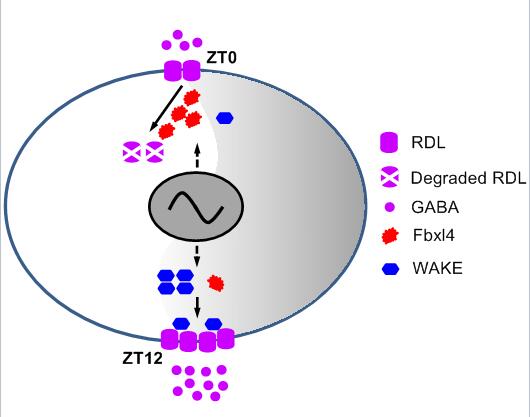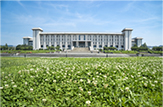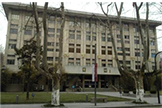
On November 23, the internationally well-known Biological Magazine “Current Biology” published the research results of the team leading by Prof. Han Junhai of Institute of Life Sciences of Southeast University—”Fbxl4 Serves as a Clock Output Molecule that Regulates Sleep through Promotion of Rhythmic Degradation of the GABAA Receptor”.
The timing of sleep is tightly governed by the circadian clock, which contains a negative transcriptional feedback loop and synchronizes the physiology and behavior of most animals to daily environmental oscillations. However, how the circadian clock determines the timing of sleep is largely unclear. In vertebrates and invertebrates, the status of sleep and wakefulness is modulated by the electrical activity of pacemaker neurons that are circadian regulated and suppressed by inhibitory GABAergic inputs. The research showed that Drosophila GABAA receptors undergo rhythmic degradation in arousal-promoting large ventral lateral neurons (lLNvs) and their expression level in lLNvs displays a daily oscillation. The study also demonstrated that the E3 ligase Fbxl4 promotes GABAA receptor ubiquitination and degradation and revealed that the transcription of fbxl4 in lLNvs is CLOCK dependent. Finally, the research demonstrated that Fbxl4 regulates the timing of sleep through rhythmically reducing GABA sensitivity to modulate the excitability of lLNvs. The study uncovered a critical molecular linkage between the circadian clock and the electrical activity of pacemaker neurons and demonstrated that CLOCK-dependent Fbxl4 expression rhythmically downregulates GABAA receptor level to increase the activity of pacemaker neurons and promote wakefulness.
The research was supported by National Natural Science Foundation of China, Ministry of Science and Technology grant, and the Fundamental Research Funds for the Central Universities. The first authors of the article are doctoral candidate Li Qian, Doctor Li Yi and Doctor Wang Xiao.
















